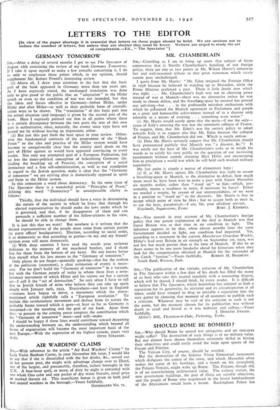LETTERS TO THE EDITOR [In view of the paper shortage
it is essential that letters on these pages should be brief. We are anxious not to reduce the number of letters, but unless they are shorter they must be fewer. Writers are urged to study the art of compression.—Ed., "The Spectator "]
GERMANY TOMORROW
Sta,—After a delay of several months I got to see The Spectator of August 16th containing the review of my book Germany Tomorrow. If I take it upon myself to make a few remarks concerning it, I do so only to emphasise those points which, in my opinion, should supplement Mr. Robert Powell's interesting review.
(t) Above all, I draw your attention to the fact that the basic part of the book appeared in Germany more than ten years ago. As I have expressly stated, the unchanged translation was done only to give proof to the public that an " adaptation " to the Hitler epoch or even to the condition of war was not intended, but that the ideas and forces effective in Germany—before Hitler, under Hitler and after Hitler—as well as their probable form of crystalli- sation were to be shown. The " translation " of this basic part into the actual situation (and language) is given by the second part of the book. Here I expressly pointed out that in all points where there is a certain discrepancy between the two parts the text of this new part is authoritative, since, naturally, the events since 1930 have not passed me by without leaving an impression, either.
(2) But just this part finds the least space in your review. Other- wise the fundamental contrasts of the programme of the "Black Front" to the idea and practice of the Hitler system would have become so unequivocally clear that the enmity until death on the part of Hitler against us would have appeared convincing to every reader. Not only our attempted goal of a European Federation, but no less the inner-political conception of federalising Germany (in- cluding the breaking up of Prussia), the conception of a social democracy and a free self-administration, as well as our standpoint in regard to the Jewish question, make it clear that the "Germany of tomorrow" we are striving after is diametrically opposed in spirit and form to the Hitler system.
In this connexion a word about democracy. In the same issue of The Spectator there is a wonderful article "Principles of Peace," defining this word " Democracy " in unsurpassable clarity as follows:
Thirdly, that the individual should have a voice in determining the nature of the society in which he lives; that through his elected representatives he should make the laws under which he is governed, and that, if he disapproves of them and can persuade a sufficient number of his fellow-citizens to his view, he should be able to change them.
It is just this that we want! But nowhere is it written that the elected representatives of the people must come from certain parties (or party offices' headquarters). Election, according to social order, is as democratic as that according to parties—in my and my friends' opinion even still more democratic.
(3) With deep emotion I have read the words your reviewer dedicates to the memory of my murdered brother, and I thank him for them from the bottom of my heart. No one knows better than myself what his loss means to the "Germany of tomorrow."
Only please do not forget—generally speaking—that for the realism of the politician (statesman), a clear estimation of events is neces- sary. For we don't build the "Germany of tomorrow" in a vacuum, but with the German people of today in whom there lives a revo- lutionary movement of which Hitler and his regime are but a certain act—I call ft the "act of destruction." So very often I have to tell that to Jewish friends of mine who believe they can take up again simply with January 29th, 1933. Everywhere—not least in England —matters have begun to move, a movement which the above- mentioned article rightfully calls a "European revolution." To explain this revolutionary movement and deduce from its nature the probable forms toward which it goes—at least as far as Germany is concerned—is the meaning and the goal of my book. Apart from this: to present to the coming peace congress the contribution which the "Germany of tomorrow" must—and will—make. I should be happy if these lines would contribute toward deepening the understand* between us, the understanding which beyond all forms of organisation will become the most important basis of the new Europe.—With the expression of my highest esteem, yours very


























































 Previous page
Previous page